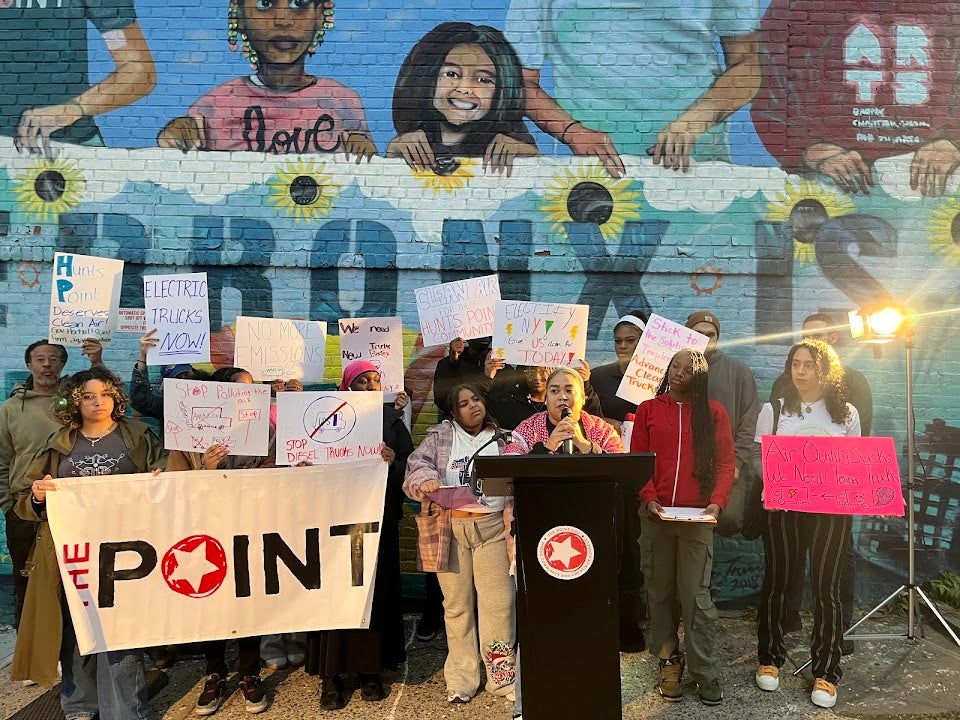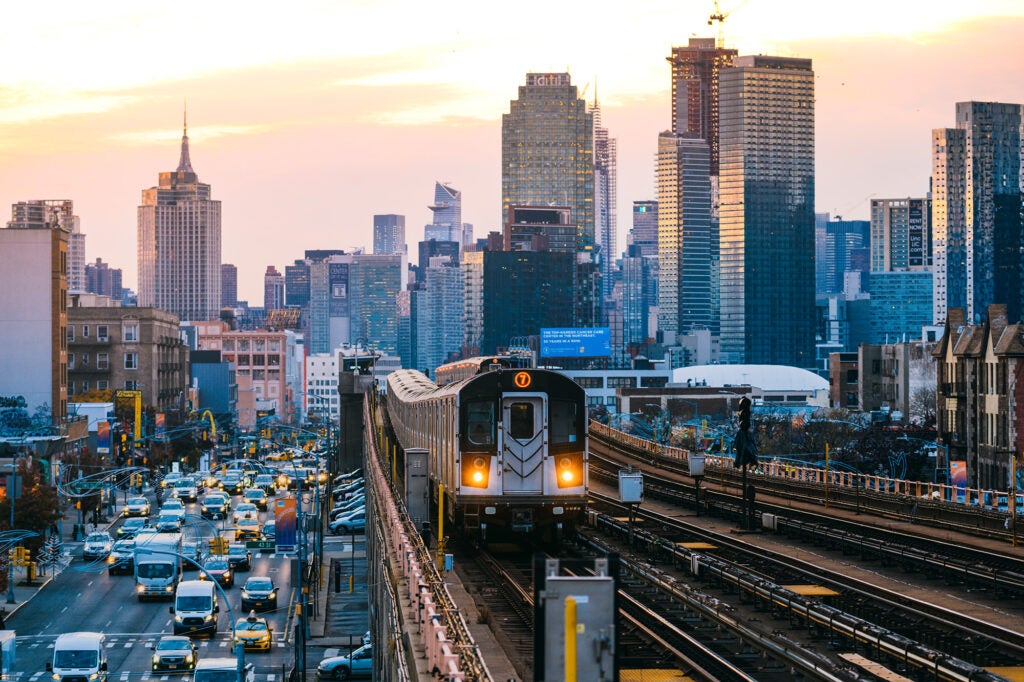Northeast Office
lavendertime / GettyImages
48 Wall Street, 15th Fl.
New York, NY 10005
(212) 845-7376
neoffice@earthjustice.org
Media Inquiries
Nydia Gutiérrez
Public Affairs and Communications Strategist
ngutierrez@earthjustice.org
Legal Assistance Inquiries
Contacto de Prensa
Robert Valencia
Estratega de Comunicaciones y Asuntos Públicos Hispanos/Latinos
rvalencia@earthjustice.org
(212) 845-7376
Who We Are
Our Northeast Office’s legal work includes national litigation to protect people’s health from toxic chemicals, regional advocacy promoting a shift from fossil fuels to clean energy sources, and local efforts to enforce the rights of communities disproportionately burdened by pollution. See bar admissions for our attorneys.
Hillary AidunSenior Associate Attorney
Meagan BurtonSenior Attorney
Fabiana CastilloSenior Litigation Assistant
Noemi FanaLegal Practice Assistant
Cristina KovalikLitigation Assistant
Susan KrahamManaging Attorney
Dror LadinSenior Attorney
Marissa Lieberman-KleinAssociate Attorney
Mariana LoSupervising Litigation Paralegal
Elizabeth MoranPolicy Advocate
Suzanne NovakSenior Attorney
Andrew SaavedraAssociate Attorney
Rachel SpectorSenior Attorney
Anne-Marie StehnLegal Practice Manager
Michael YouhanaSenior Associate Attorney
Our Impact
Since 2008, the Northeast Regional Office has engaged in groundbreaking work to address the impacts of pollution and climate change in one of the most densely populated parts of the country. That work includes fighting for environmental justice and civil rights, advocating for clean water, stopping fossil fuel and coal development, and pushing for a just and equitable transition to clean energy and implementing transformative state legislation.
Earthjustice’s office in New York also serves as headquarters for our Sustainable Food and Farming and Toxics Exposure and Health programs. The Northeast Regional Office collaborates closely with our Biodiversity Defense, Clean Energy, Community Partnerships, and Tribal Partnerships programs on local and national casework to enhance our litigation, advocacy, and rulemaking expertise.
Implementing New York’s Groundbreaking Climate Law
After years of work to secure the Climate Leadership and Community Protection Act (CLCPA), Earthjustice is working with environmental justice groups and many others in New York towards robust implementation and to create a body of legally enforceable laws and policies rooted in the CLCPA. The law is both protective and affirmative; it can be used to stop massive fossil fuel projects and it can be used to reduce health-harming and climate-altering emissions like those from buildings and transportation — the top two emitting sectors in New York State.
Earthjustice is working aggressively to push every New York agency, including the New York Department of Environmental Conservation (DEC), the New York Department of Transportation and the New York Public Service Commission (PSC), to comply with the CLCPA, and to make climate justice a factor when issuing permits, allocating funding, and greenlighting projects. We are pushing, too, for proactive policies to electrify buildings and transportation.
Highlights:
- Stopping a gas plant in Astoria, Queens. Working with No Astoria NRG and the PEAK Coalition, along with public officials and community leaders who have long opposed the gas plant, we successfully proved to DEC the necessary permits must be denied and successfully defended the decision over the next year. As of May 2023, the gas plant is closed forever, and the site will transition to wind energy.
- Bringing clean, electric school buses and trucks to New York streets. Thanks to Earthjustice and our partners’ advocacy, in 2022, New York became the first state in the country to require a fully zero-emission school bus fleet. All school buses in the state will be electrified by 2035. We are now working with various state agencies to support implementation of the state’s school bus mandate.
- Accelerating the transition to clean energy and building electrification. Greenhouse gas emissions from residential and commercial buildings are the single largest source of carbon emissions in New York and are a serious health concern. Earthjustice served an instrumental role in the adoption of laws to ensure new construction statewide is all-electric. We are building upon these wins to advocate for policies that will move the state away from our dirty and expensive gas system at a neighborhood scale.
- Ensuring New York’s Climate Law protects Frontline Communities and avoids fossil fuel industry-favored false solutions. Earthjustice engages in gas planning proceedings and represents environmental justice and community-based organizations in utility rate proceedings to oppose proposals that would require New Yorkers to pay for polluting infrastructure that would prolong the gas system, advance false solution such as alternative combustion fuels, or reproduce existing injustices in our energy system.
- Implementing NYC Congestion Pricing. New York City has the worst traffic of all large cities in the United States. Every year, more than 1,000 NYC residents die prematurely from motor vehicle air pollution alone. Motor vehicles are the city’s second-largest source of greenhouse gas emissions. After years of advocacy by transit riders, unions, and clean air activists, in 2019 the NY Legislature adopted a first in the nation congestion pricing plan that was carefully designed to ease traffic, improve air quality, and raise about $1 billion a year to fix the city’s mass transit system. After careful study by multiple state and federal agencies, a pricing plan designed to reduce traffic by charging drivers for entering traffic-heavy zones, was scheduled to begin on June 30, 2024. Weeks before the start date, NY Gov. Kathy Hochul announced an “indefinite pause” on the program, leaving New Yorkers stuck with poor air quality, greenhouse gas emissions unabated, and the public transit system with a huge hole in its budget. Representing Riders Alliance, Sierra Club, and the New York City Environmental Justice Alliance, Earthjustice sued Gov. Hochul and the state of New York, arguing that blocking the congestion pricing plan is a violation of the CLCPA and the constitutional right to clean air. The case has now been settled, and Congestion Pricing began on January 5, 2025. Earthjustice has also joined other environmental advocates defending congestion pricing from other challenges.
Getting Fossil Fuels Out of Homes
Most New Yorkers use fossil fuels for cooking and home heating. But burning fossil fuels indoors is New York City’s largest source of greenhouse gases and accounts for almost a third of the state’s emissions. Research shows that indoor fossil fuel combustion can have adverse health impacts including asthma, cancer, and childhood learning deficits. Working with community-based and environmental justice groups we advocate for an equitable transition away from harmful fossil fuels.
Highlights:
- Building Electrification. We have advocated for cutting-edge legislation to reduce indoor fossil fuel combustion, including New York City’s Local Law 154 and New York’s first-in-the-nation law ensuring that all new construction is all-electric. Now we are defending those laws in court against gas industry attacks.
- Making Energy Affordable. Alongside a large and diverse coalition, Earthjustice is pushing for passage of the NY HEAT Act, which will save New Yorkers money on their energy bills while giving the state the necessary tools to move homes and businesses away from the dirty, expensive gas system at a neighborhood scale.
Enforcing the Constitutional Right to Clean Air, Clean Water, and a Healthy Environment
In 2021, over 70% of New York voters approved the addition of a new Environmental Right to the Bill of Rights of the state Constitution. That Right provides: “Each person shall have a right to clean air and water, and a healthful environment.” Earthjustice is engaged in ensuring the promise of this groundbreaking constitutional right is realized by New Yorkers, particularly those who have suffered disproportionate environmental harms. Earthjustice is asserting claims under the Environmental Right in several of its cases.
Partnering with impacted communities to oppose polluting facilities
- Protecting Communities from Last-Mile Warehouse Pollution. “Last-mile” refers to the final stage of delivery from a hub to the consumer — and last-mile facilities generate three to four times as much truck traffic and pollution as a traditional warehouse. Millions of square feet of e-commerce warehouses have been planned or developed in New York City, clustered within Brooklyn, The Bronx, Staten Island, and Queens with no comprehensive planning and no regulations or public review process in place. As part of the Last-Mile Coalition, Earthjustice is working to address this threat. Alongside The New York City Environmental Justice Alliance, The Point CDC, UPROSE, El Puente, Red Hook Initiative, and Newtown Creek Alliance we are advocating for rules to ensure these facilities are no longer clustered in overburdened communities. We are also working with a statewide coalition of transportation, labor, and environmental advocates to develop statewide rules to mitigate emissions from mega-warehouses across New York State. The Clean Deliveries Act would create the first statewide “indirect source rule” to address air and climate pollution from the unregulated mega-warehousing sector.
- Shutting Down the Seneca Meadows Landfill. This privately owned and operated 400+ acre landfill is New York’s largest and accepts waste from around New York and surrounding states. Its permit expires in 2025, but its operators want to expand the landfill and extend its life for another 15 years. The landfill is a major source of greenhouse gases and produces more than 70 million gallons of wastewater each year that is contaminated with per- and polyfluorinated substances (PFAS), also known as “forever chemicals.” The PFAS-contaminated wastewater is then trucked to wastewater treatment plants across the New York metropolitan area where the PFAS-tainted wastewater is discharged, untreated, to enters waterways, many of which are upstream of drinking water sources. Alongside our partners Seneca Lake Guardian, Sierra Club, Committee to Preserve the Finger Lakes, and Fossil Free Tompkins County, Earthjustice is fighting the landfill’s plan to expand and operate through 2040.
Addressing the Environmental and Energy Impacts of Cryptocurrency Mining
Cryptocurrency mining uses an immense amount of energy and produces staggering emissions when powered by fossil fuels. As a result of years of work in Albany by Earthjustice and our partners — including Seneca Lake Guardian, Clean Air Coalition of Western NY, and Food and Water Watch — and despite significant industry opposition and spending, New York Governor Kathy Hochul signed first-in-the-nation legislation establishing a two-year moratorium on fossil fueled cryptocurrency mining and directing an environmental review of the practice. Alongside our partners, we are working to ensure the state’s environmental review process is comprehensive and follows the science, and that the state adopts policies to make sure cryptocurrency mining doesn’t hamper its ability to meet our climate law mandates. We are also engaged in litigation and administrative advocacy to stop New York from allowing cryptocurrency companies to buy personal fossil fuel plants without assessing the climate and environmental justice impacts.
Fighting for Clean and Safe Water
The Northeast Regional Office advocates for access to clean, affordable drinking water.
Highlights:
- Lead in Drinking Water. Earthjustice has been advocating at the federal, state, and local levels for stronger laws to protect people from exposure to lead in drinking water for several years. At the federal level, we challenged the first Trump administration Environmental Protection Agency’s (EPA) Lead and Copper rule (LCR) and coordinated with frontline partners around the country to advocate for stronger regulation. As a result of these parallel efforts, EPA has now adopted amendments to the LCR that would take important steps forward in removing and replacing lead pipes, the main source of lead in drinking water. With this new rule, Earthjustice is now advocating for New York State to provide the funding and policy solutions necessary to ensure the equitable replacement of all lead service lines at zero-cost to residents. And in New York City, Earthjustice and its partners have been advocating for NYC Department of Environmental Protection to replace all lead service lines in NYC at no cost to individual property owners. See our report: No Excuses, NYC: Replace Lead Drinking Water Pipes Now.
- Fighting to Protect Owasco Lake from Contamination and Prevent a Drinking Water Crisis. The New York State Department of Health (DOH) has the authority and obligation to enact legally enforceable “Watershed Rules and Regulations” (WRRs) to protect drinking water sources. WRRs are powerful because they can be used to prevent contamination at the water source, rather than treating it at the tap. WRRs also provide a mechanism for communities to work with DOH to preserve their drinking water sources even if those sources lie outside of the community’s municipal boundaries. In Cayuga County residents and officials worked with DOH for years to update WRRs for Owasco Lake, a drinking water source for 40,000 that has increasingly been contaminated by agricultural runoff and harmful algal blooms. But at the 11th hour, DOH abandoned the WRR update claiming it had no authority to regulate agricultural runoff. Earthjustice represents the Town of Auburn and the City of Owasco in their efforts to achieve WRRs that adequately protect their communities’ drinking water resource.
- Protecting the Town of Thurston from sewage sludge polluting well water with PFAS. Tests of private wells in the Town of Thurston showed high levels of PFAS in wells near agricultural land. Research demonstrates that sewage sludge, a residual by-product of wastewater treatment often used as fertilizer, frequently contains PFAS. It also often contains heavy metals, pathogenic bacteria, and viruses, making it hazardous to human health. With Earthjustice support, Thurston enacted a local law restricting the spreading of sewage sludge on agricultural lands in the town. Earthjustice now represents the town in an administrative proceeding challenging the law as an unreasonable restriction on the “right to farm.” Earthjustice has also been working with a Pennsylvania town in a similar ordinance and challenge.
Working with Tribal Partners to Protect Natural and Cultural Resources
Highlights:
- Earthjustice has joined forces with the Tonawanda Seneca Nation, or Ta:nöwö:de′ Onödowá′ga: Yoindzade′, in trying to prevent a “manufacturing mega-site” adjacent to Nation land, which will take a heavy toll on the Nation, its reservation, and the surrounding environment. Earthjustice has challenged several permits for the project including U.S. Fish and Wildlife Service’s approval of a sewage and industrial wastewater pipeline through the Iroquois National Wildlife Refuge. Our lawsuit detailed the impacts on the Refuge and the Nation and shortly after filing, the U.S. Fish and Wildlife Service withdrew the permit.
- Earthjustice represented the Penobscot Indian Nation, the Houlton Band of Maliseet Indians, and the Natural Resources Council of Maine in opposition to a zoning change in Maine’s North Woods, the largest intact, undeveloped forest in the eastern United States. The rezoning would have allowed Wolfden Resources to mine 400 acres of undeveloped forest land abutting pristine native brook trout waters and critical habitat for endangered Atlantic Salmon in the Penobscot watershed where the Penobscot Indian Nation has sustenance salmon fishing rights, and near other land the Tribes use for hunting, fishing, and gathering. As a result of our successful advocacy, and in partnership with our clients, we persuaded the Maine Land Use Planning Commission to deny the zoning change and instead protect the Nations’ natural and cultural resources from extractive industry.


